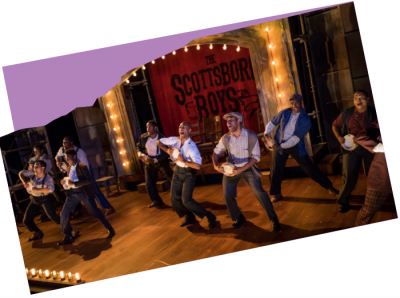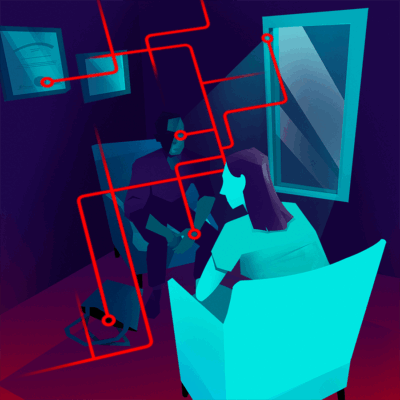Your donation sets the stage for a new season of Boston's most intimate, entertaining and provocative plays and musicals. Our shows make powerful connections with our audiences-- and they are only possible because of you.
Meet Nile Scott Hawver
Meet Nile Scott Hawver
Nile Scott Hawver is back at SpeakEasy for his third show on our stage, having previously played Will in Mothers and Sons and Monty in Violet (2016). But what SpeakEasy fans might not know is that over the past two or three seasons, much of SpeakEasy’s poster photography and show photography was shot by Nile. With talents both onstage and behind the camera, we sat down with Nile to see if there was anything he couldn’t do.
Don’t miss Nile in Once, running Mar 1-Apr 7, 2019.
What attracted you to audition for the musical ONCE?
To be honest, it’s simply one of those dream roles (and dream shows) for me. Singing and playing music might be my very favorite way to spend time. To get to have nearly two months doing just that with a wonderful cast, playing a role that is both challenging and rewarding is something I’ve always wanted to experience. (Also, I’ve been told I should play “Guy” at least once a week for the past five years or so.)
In your own words, what is ONCE all about?
Once is about being stuck; being paralyzed and unable to take the steps towards realizing your potential. It’s about how the solution to this paralysis is almost always connecting with other human beings. Sometimes we can’t find the right language to make that connection, and in Once, the right language ends up being music.
Tell us a little bit about the character you play “Guy”:
Guy is stuck. He’s a gifted and hardworking singer, songwriter, and musician, but he can’t seem to make the most of his abilities. He’s heartbroken and lost, and he starts the show ready to walk away from the things he loves most. It’s pretty clear that Guy is depressed, and his depression manifests itself as coldness and a gruff, dismissive persona. However, beneath this exterior shell, I believe, he’s really a sensitive, thoughtful, and kind person.
Why do you think the authors decided not to give the lead characters names, instead calling them “Guy” and “Girl”?
I think it really helps contribute to the universal appeal of the show. Guy and Girl, while three-dimensional, are, I think, meant to act as blank slates onto which the audience can project themselves. Most protagonists in stories are like this to some degree, but Once really wants us to relate to these two archetypes-made-flesh.
What do you like about your character?
I like his artistry, the way he expresses himself through music. His (well, really Glen Hansard’s) music and lyrics are beautifully simple, (which is a contrast to my own difficulty with simplicity in both life and art.) Guy’s terseness and directness of speech are also very appealing. His love for his family and making and playing music shine through as well. He’s also no sellout- he refuses to compromise his artistic integrity for money or mass acceptance, which I find extremely admirable.

What, if anything, do you think that you and “Guy” have in common?
We both are driven by creative expression; we both love performing and playing music, obviously. I’m a little more confident and positive then he is, especially at first; but I think there’s plenty of ways in which I’m still stuck. I think we’re all like “Guy” in that way- what moves, big or small, are we afraid to make? What scares us even though we know it is what we have to do?
One of the challenges of ONCE is that all the actors must also play all the instruments. There is no separate band. What musical instrument(s) will you be playing in the show?
At this point I only play acoustic guitar, but I’m hoping to sneak in some mandolin somewhere!
How much more challenging is your work as an actor if you are also responsible for the music?
It sounds funny, but I find playing the songs makes things easier. It’s where I come from; I was a guitarist, singer, and band musician well before I started acting. I remember in high school plays I had a hard time being in musicals without an instrument in my hands; my director had to find an excuse to give my character a broom as a stand-in for a guitar. I find it gets me out of my head and gives my hands something to do. Obviously, there’s more material to learn, but I enjoy it so much it doesn’t feel like work.
The play is set in Dublin. Have you ever been to Ireland? If so ,what memories does this show conjure up for you?
I did visit Ireland in 2017, as part of my all-too-short honeymoon. There were surprisingly fewer buskers than I expected there would be, but the show does beautifully capture the compact, old-world, straightforward richness of that country. It’s a small country and Dublin is a small city, but there’s so much depth- I think this musical nails that visual and aural aesthetic.
What do you think explains the popularity of this Tony Award-winning show?
It’s a universally appealing production! It isn’t ponderous, it isn’t epic, it doesn’t feel huge and unattainable and grandiose. There’s always a place for that grandiosity in musical theatre, of course, but I think people were so surprised and refreshed to see such an intimate and unassuming show next to theatres playing Wicked and Phantom and Cats. The music is excellent throughout; the songs say so much without saying too much, and the story has happened to each audience member at some point. What audience member hasn’t experienced heartbreak, felt stuck, fallen in love, or made that first big step into a new world? Once has all of that and more.
In addition to being a fine actor you are also Boston’s pre-eminent theatre photographer, shooting rehearsal and/or production photos for most of the professional companies in town. How did you get your start in photography?
(Pre-eminent? Thank you!) After about two decades of being fascinated by both art and technology, it made a lot of sense that I picked up a digital camera. I was touring with Montana Shakespeare in the Parks in 2012, and the natural wonder of that state was just too amazing to photograph with my iPhone. I bought a DSLR in Kalispell, and fell in love with the combination of instant gratification and patient tinkering present in landscape photography. I then of course started to lust after better gear, and decided to focus those nice lenses on people’s faces instead of on mountains. I turned out to be pretty OK at taking headshots, and the rest led me here!
Why do you think you have gravitated toward theater photography?
Quite a few successful photographers in all genres and styles have turned what their non-photographic passions into a viable career. I love theatre all of it- and when I can’t be onstage, I still want to be in the room where it happens. I essentially get paid to watch almost all the wonderful shows in town, and that’s amazing! I also really enjoy the feeling of having contributed to a show even when I’m not otherwise involved. If my promotional or production photography can help sell tickets, all the better for my fellow theatre artists!
What, in your opinion, makes for a good production photo?
I think there’s two kinds of great production shots. One type is those that capture the inherent theatricality of the production – we can see the lighting and staging and costumes and set and props and actors really at work and it feels very much like being there and seeing it. The other kind is a much tighter, more intimate shot, which often just features the face of one or two actors. If it really works, this second shot can tell even more of a story than a sweeping wide-angle tableau. I also am obsessed with image quality, and theatre photography in particular pushes even the best equipment to its limit. I take great pride in making extremely high quality photos in even the most difficult and diverse lighting and staging scenarios.
May we have a link so folks can see a sample of your theater work?
Of course! Some of my favorite recent work is here: please try and see these shows if they’re still running!
You also have done headshots for many of your fellow actors in town. What is the secret for shooting a good headshot?
Obviously there’s lots of tricks and rules about lighting and posing and clothing and makeup and all that. However, the real secret is that shooting a great headshot is in the hands of the actor. The actor has to communicate, has to know themselves and be open to the experience of shooting, has to come in with ideas and guidelines and goals. The best sessions are always those where an actor does their prep for what is essentially a two-hour, two-person, improvisational play. Like a studio engineer recording a band, I know what buttons to press, what equipment to use, and how to get the artist to sound their best, but the musicians still write the songs and provide the creative raw material.
Next up for you is MILLON DOLLAR QUARTET for Greater Boston Stage. Tell us about that show and who you play.
Million Dollar Quartet (directed by Once choreographer Ilyse Robbins) is a jukebox musical about a famous recording made in 1956, during which Johnny Cash, Elvis Presley, Jerry Lee Lewis, and Carl Perkins had a rather impromptu jam session in a studio. I play Carl Perkins, who wrote Blue Suede Shoes; he plays lead electric guitar on the album and in the play.
You have a very busy schedule between all your photography assignments and acting gigs. What do you like to do to just relax?
Oh man, I forget what relaxing is. I guess I enjoy the occasional computer game (my photo editing PC doubles as a pretty sweet gaming computer). I try to read as much as I can. If I happen to have an entire free day, I love to go hiking and maybe take the occasional landscape photo. I’ve been super into podcasts too, as I can listen to them while I edit photos or while riding my bicycle to the theatre. (Check out The Adventure Zone or My Brother, My Brother, and Me if you get a chance!) Lately I’ve just been really relishing any time I get to spend with my wife, Maggie: a lazy morning and a shared breakfast even once a week is a delight, and feels hard-earned and special. In the end, though it sounds cliche, I am grateful that I spend nearly every waking hour doing something I love that is rewarding, interesting, or both!
 Past Productions
Past Productions JOB
JOB The Antiquities
The Antiquities Swept Away
Swept Away




